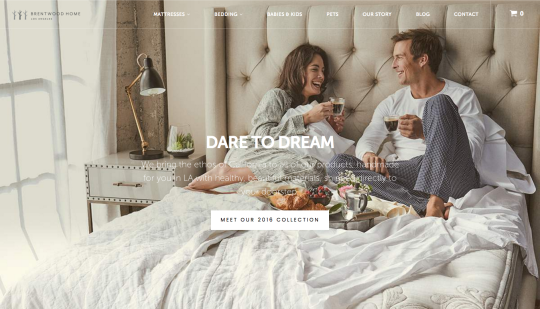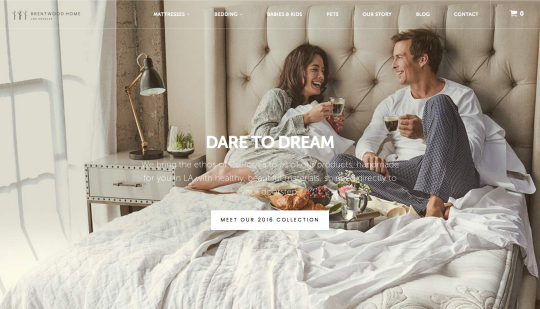
Log onto Brentwood Home’s website, and before you even get to
think about buying a mattress or a pillow (or a dog bed), you’ll find yourself
reading up on the healthy, natural materials they use to make your mattress:
Bamboo. Organic cotton. Wool. Kapok. Organic latex.
Vy Nguyen, Brentwood’s CEO and president, a
second-generation mattress maker and seller, explains: “The mattresses are our core
product, but we’re a lifestyle brand. Our products are all about creating an
environment where you get better, healthier sleep. We’ve extended into
all-natural bedsheets, all-natural pillows, quilt covers, kids’ cribs and
mattresses. Even dog beds.”
It’s
easier to keep products healthy when you control the manufacturing process
yourself—and that’s just what Brentwood Home does. The company designs and handcrafts 98 percent of the products
it sells, working with another local,
family-owned company for eco-friendly dyes.
The Whole Boat Thing
Brentwood Home’s backstory goes back a long way—to the
Vietnam War, and Vy’s father, Le Duc Nguyen, a former
South Vietnamese helicopter pilot and ex-POW. Le Duc escaped from Vietnam, with
his four kids, on an 80-person wooden fishing boat.
“We did the whole boat thing,” Vy
remembers.
The Nguyen family were refugees in Hong Kong for a
year. Finally they immigrated to southern California where Le Duc got a job
working at a furniture store. Soon he worked his way up to a salesman’s role. He
ended up partnering with the owner to open four or five additional furniture
stores. Then, in 1987, Le Duc and his partners decided to start their own small
mattress factory. That’s how the Nguyen family got into the mattress business.
After
he graduated from university, Le Duc’s son Vy joined several of his high-tech
pals in an internet start-up called Pricegrabber.com.
It was a pricing-comparison website, and Vy got an in-depth look at how ecommerce
actually worked. Using his dad’s contacts he tried selling a few mattresses and
pillows online. Then, in 2009, just as the recession was hitting, Vy bought out
his father to take control of two mattress factories. Soon he was developing his
own Brentwood Home items. Vy’s siblings helped. In fact, all four siblings now work
at Brentwood. Le Duc is retired.
“The
business has changed quite a lot since my father’s day,” Vy recalls.
“When he comes by the office, he’s always surprised to see so many white
collar guys instead of the factory workers he’s expecting. Because back in his
day there were just two or three office people and a bunch of factory hands.
Now we’re trying to build a lifestyle brand, doing retail online; you need a
whole different set of skills.”
When
Vy started Brentwood Home, the operation included 30 people. Today, the company
employs around 170 staffers—some 130 of them working in the 230,000-square-foot factory in Pico Rivera,
ten minutes south of the main office in downtown Los Angeles.
Bed In a Box
Brentwood
Home sells mattresses, but more to the point it sells mattresses online.
Typically this line of business has been problematic. How do you ship a large,
awkward object like a mattress to your ecommerce customers without charging
astronomical shipping fees? Brentwood uses innovative “bed-in-a-box” technology that allows each mattress to be compressed,
rolled, sealed and boxed for shipping; it expands to its natural shape when the
buyer unpacks and unrolls it.
Figuring out how to ship
mattresses wasn’t the only challenge Vy faced.
Another
was assembling the network of talents and skills he needed. As the company
grew, and Vy struggled to develop an ecommerce business and the Brentwood Home
brand, he soon discovered that he needed people with completely different skill
sets from those he had been dealing with in the manufacturing business.
“We needed people who understood branding, marketing, developing websites,
the technology behind the sites… If you’re not in that network already, finding
the right people can be difficult. I solved that by reaching out to the people
I knew at Pricegrabber. They were all at different startups by now, so I’d be
talking to their technical people. Branding. Development. I must have met a
dozen marketing directors.”
Making Social Media Work
One
term Vy heard a lot from those marketing directors was “social
media.”
“The
phrase ‘social media’ sounds easy enough,” says Vy, “but in order to
do it properly we had to get an in-house photographer and an in-house stylist,
so the photography showed our products the way we wanted to present them. At
first we were just running around taking pictures with our iPhones and posting
them on Instagram. But unless you have consistency of image you can’t build a
brand over time. Just recently I put together a small team to handle social
media. So our posts will have the right look, with a copywriter to get the
message right every time. All those little nuances. Nobody teaches you how to
do that.”
Site Specific
Every
ecommerce business will agree that designing the site is critical. What do you
design in? What should you leave out? Brentwood Home has been refining its site
from the start. The current version is its third major revision.
“What
we want is to have an emotional impact,” Vy explains. “When the
customer gets on the site we want them to feel an emotional attachment to our
brand, and our products. It’s not a matter of, ‘Hey, we want to sell you this
mattress.’ We want to add a warm touch to the site. That’s how we differentiate
our self. Some companies tell you that they’re taking a technology approach,
they’re using some algorithm to create the best mattress for you… We still feel
that your mattress is a very personal space. It’s your bed. When you go to our
website you feel warm, and at home. That’s what we’re trying to convey.”
If
that sound vaguely Californian, it’s no accident. The site is perfectly
explicit when it boasts: “We bring the ethos of California to all of our products."
Not Mattress-Specific
That
must be the right message at the right time, because Brentwood Home was into
the black within three years of its start—with 50 percent annual growth over
the last several years.
"The
mattress industry is broken up into several brackets,” Vy explains.
“You’ve got your big S’s—Sealy, Serta, Tempur—big guys who dominate 70
percent of the market. And then you’ve got everybody else. In this
‘independent’ group, Brentwood Home has a different messaging: We’re a
lifestyle brand that encompasses everything that creates an environment for a
better night’s sleep. We’re developing products for everything in your bedroom,
everything in your bathroom. We’re not just mattress-specific.
"That
said, we are one of the largest independent brands—and we
ship higher volumes online than even the big brands. They have not developed
online programs due to channel conflicts with existing partners. We don’t
have those issues since Brentwood Home is only sold online.”
And the Planet
Brentwood’s
eco-driven core is more than mere philosophy. The company gives back to the
local community, and the planet, by donating mattresses to local shelters and
working with the National Forest Foundation to plant trees in areas of need
across the country.
That’s
restful news for everyone. Including your dog.




